BACK ON THE ROAD OP-ED
Africa’s Travel Indaba highlights how tourism has become SA’s economic panacea
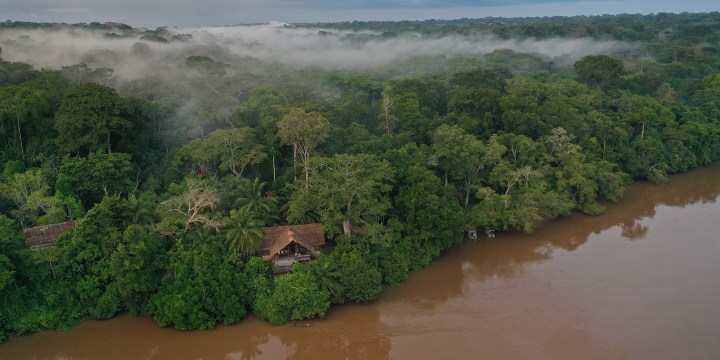
Tourism was possibly the industry hardest hit by Covid in South Africa, and to varying degrees around the world. The well-established, annual Africa’s Travel Indaba in Durban has always provided an indicator of the health of the industry, and the 2022 indaba – the first since 2019 – was a gloomy affair, with one of the two enormous exhibition halls looking decidedly cavernous. With the 2023 edition having wrapped up this month, tourism has returned with a big bang.
The more I engage and interact with tourism products and communities – while the country’s ruling party flip-flops between corruption, legal objections and straightforward crime – the more I see the tourism industry as being a partial panacea to South Africa’s employment and economic ills, as I think former minister Valli Moosa referred to it, a few years before one Jacob Zuma took his turn at steering the chariot, unleashing his hedonistic horses of hell.
Yet even thieving steeds could not dampen the enthusiasm of the travel industry, south of the Sahara. “Over 21,000 meetings between buyers and exhibitors, 1,023 exhibitors and over 1,700 buyers.” These are some of the early statistics received from South African Tourism (SAT), which organises the Travel Indaba.
Adding context, the newly appointed chairperson of the SAT interim board, Tim Harris – formerly CEO of Wesgro (Western Cape Tourism, Trade and Investment Promotion Agency) – noted that there was a 60% increase in meetings and a “dramatic recovery in the level of interest in the South African and African tourism offer”.
Hallelujah
Indeed this year’s Travel Indaba was pure good news and happiness, a few days’ escape from the host country’s blackout reality (until the lights in the halls went out, eliciting a collective “ooh” from tour operators flown in from overseas, followed by an “aah” from assembled exhibitors when the generators kicked in). Everyone attending “Indaba”, as it’s known, wore smiles, excited at the chance to show off their respective products (from luxury lodges and experiences to the latest in canvas safari tents), reconnect with colleagues from distant lands and to do business again.
Among those showing off were the mostly high-end accommodation establishments and a couple of intra-African airlines gathered under the Africa Travel & Tourism Association (ATTA®). Association executive director Chris Mears, speaking from London after his return from Indaba, says the demand from its members for participation at the 2023 travel show was strong “from the moment” that ATTA® opened the doors to them to participate in the experience.
Yeeha!
Mears says the number of exhibiting member companies –70 – was nearly double last year’s participation. Among the ATTA® participants were Easyjet’s southern African love-child, Fastjet, and the Classic Safari Camps of Africa representation company (which had pulled out of last year’s Indaba, claiming poor administration).
Mears says it was the largest-ever ATTA® stand in its 30-year history, and that “strong business was being written at meetings on the stand all the way through to the final minutes of the show”.
Federated Hospitality Association of South Africa (Fedhasa) chairperson Rosemary Anderson says she was encouraged by the increased engagement between the public and private sector, referring to the “fantastic job” new Tourism Minister Patricia de Lille did in engaging with exhibitors and visitors, “seeking to understand the challenges the tourism industry faces”.
SAT CEO Nomasonto Ndlovu, a former Limpopo Tourism CEO and highly regarded by that province’s experienced tourism heavyweights, says she received at Indaba “a clear sense from various stakeholders of a greater commitment for industry to work together and to grow the sector back to beyond pre-Covid levels”.
Far North of the Limpopo
While noting that the Travel Indaba provides a powerful platform to showcase the best of what is effectively sub-Saharan Africa’s tourism sector, Ndlovu said the 22 African exhibiting countries from the rest of the continent cemented this year’s theme of Unlimited Africa.
Such an example, perhaps as extreme as ‘unlimited’ in the geographical sense, would be Sangha Lodge, located on a riverbend deep in the rainforest of the Central African Republic rainforest. This is Africa’s Amazon.
While not only home to the BAaka people, the forest around the lodge hosts picathartes, about 13 primate species, black-bellied pangolins, and the famed forest elephants of Dzanga Bai – made famous by a National Geographic cover story. Indaba provides a platform for lodge owner and bird guide Rod Cassidy to share Sangha’s remarkable narrative, which involves a cast of characters as compelling as the forest and its inhabitants.
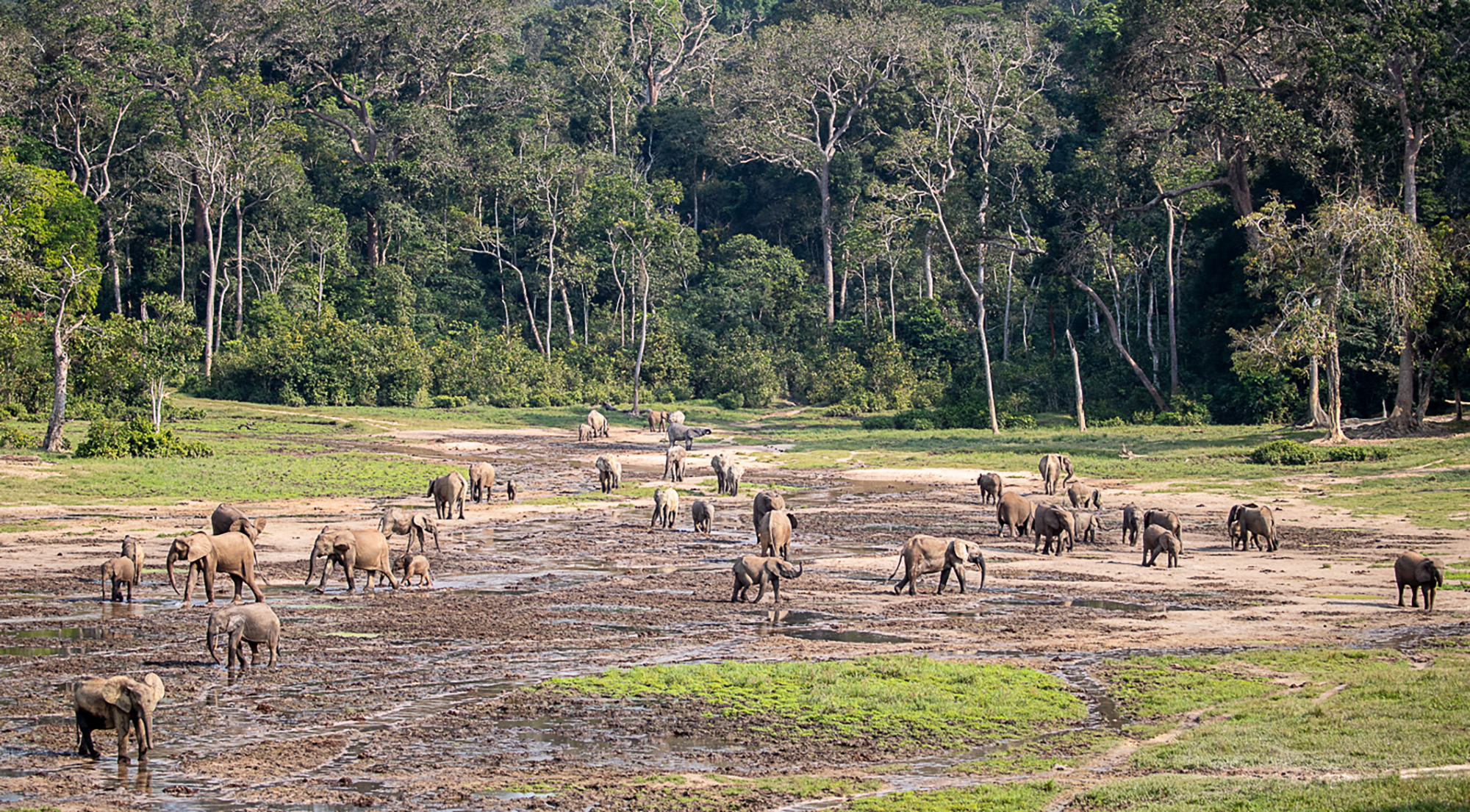
The legendary forest elephants in the mineral mud wallow of Dzanga Bai, made famous by a National Geographic feature. Destinations like this need to be marketed at trade shows like the Travel Indaba to bring in the guests — whose fees assist in employing some BAaka people, putting income into the village, and help owners Rod and Tamar Cassidy to maintain their position as unofficial forest guardians. (Photo: Rod Cassidy)
“Everything was better, this was the best Indaba I’ve attended,” says Cassidy, noting that he had over 50 meetings and that he felt the interest shown would “definitely be converted” into bookings.
South of the Limpopo
Looking inward, Ndlovu speaks of tourism as “one sector that can meaningfully contribute to youth empowerment”, noting the young people from various tourism educational institutions working at Indaba while gaining first-hand exposure to the industry. Picking up on the theme of Ndlovu’s experience and passions, veteran lowveld safari guide, mentor and lodge GM Michel Girardin, says tourism routes such as Limpopo’s Ribola Art Route were a major focus for Ndlovu. “She always explored ways of promoting these lesser known routes while Limpopo Tourism CEO”.
Tourist products and motivated entrepreneurs provide employment and careers in rural, geographically rich yet typically “poor” regions of the country, such as along the above-mentioned, thoroughly “authentic” – to use industry jargon – Ribola route. Especially in the northern parts.
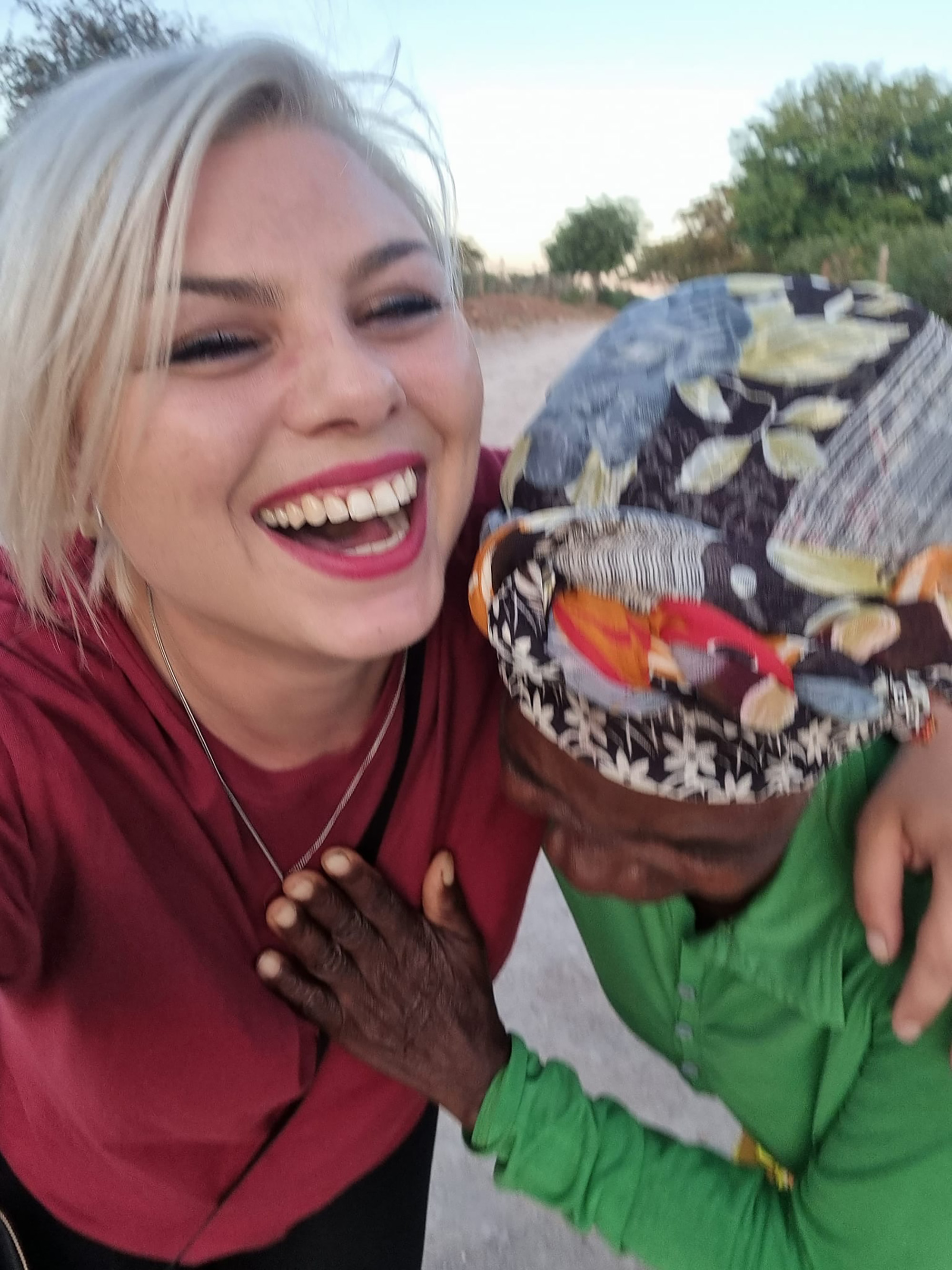
Kylie Henn-Murray with one of her ‘homestay moms’ in the Gumbi community, adjacent to the Somkhanda Game Reserve, Northern KZN. (Photo: Supplied)
Kylie Henn-Murray, co-founder and MD of Traditional African Homestays Southern Africa (TAHS-SA), works in those northern areas. She says her organisation uses tourism as a vehicle to uplift local communities, even when not neighbouring a game reserve or a park.
Henn-Murray cites the Soutpansberg village of Makushu, which is not on a tourism route and more than an hour’s drive from the Kruger National Park’s Pafuri gate or Mapungubwe National Park. “It’s completely remote and in the mountains; yet Makushu hosts international visitors every week, people looking to immerse themselves in an authentic cultural experience, before or after they visit a park”.
TAHS-SA has caught the eye of “conscious” overseas tour operators, precisely because it makes the proverbial difference, focusing on including communities in the value chain, creating a multiplier effect within them.
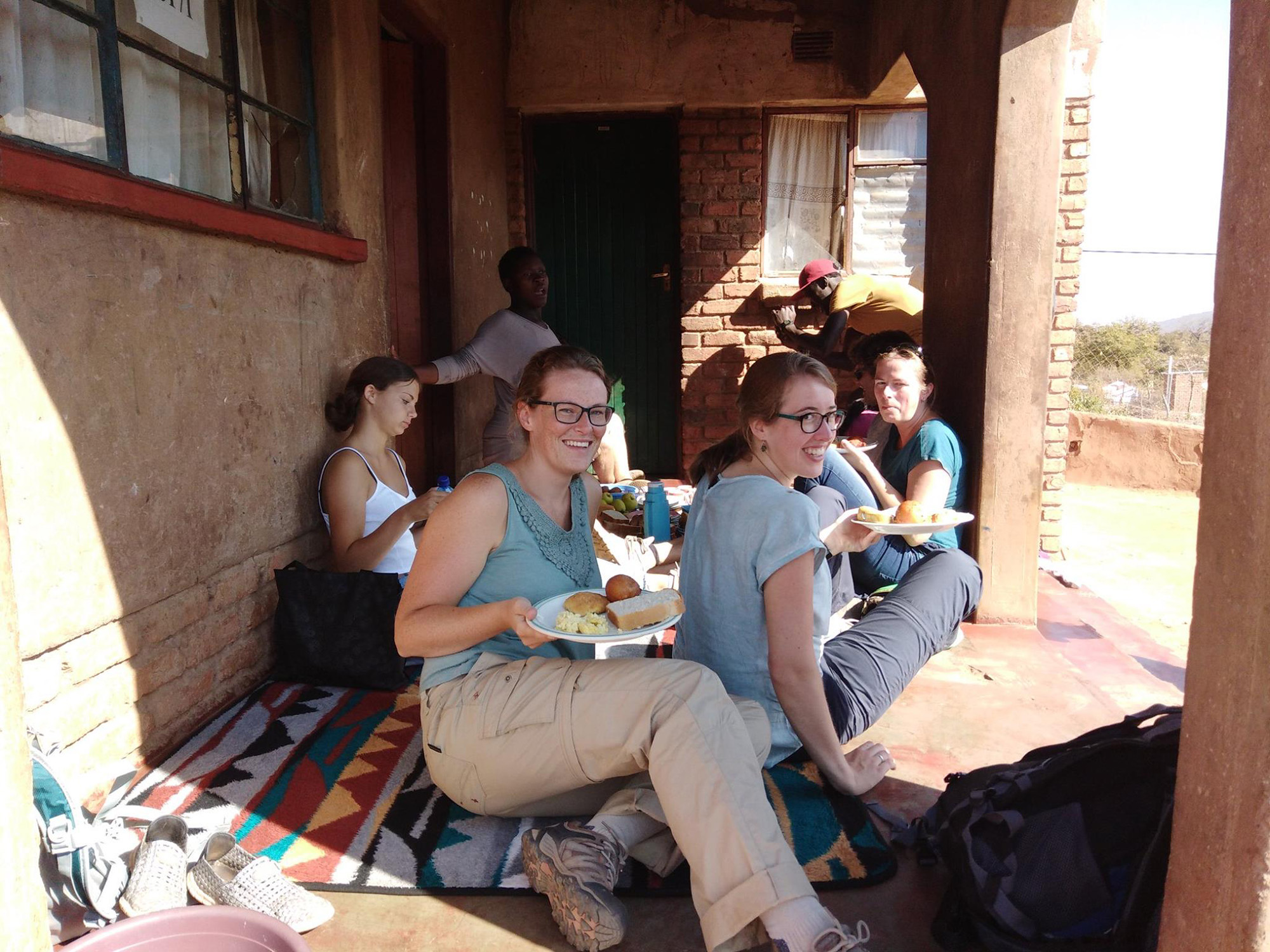
Dutch travellers visiting the Phiring community on the Panorama route, Mpumalanga. (Photo: Supplied)
“Small micro-economies are created, which enhances the income and opportunities within these rural villages.” Henn-Murray is also working with villages in Mpumalanga and KwaZulu-Natal and has received requests from other areas to implement her model.
Far south as the vulture flies, at the socio-economically more troubled southern end of the Kruger National Park, reveals another aspect to “community” tourism. Near the park’s Numbi gate is a mid-level luxury tented camp, the physical manifestation of a 50-50 partnership between the Mdluli community and their partners. A tourist was shot and fatally wounded outside the Numbi gate earlier this year. Much like with Hout Bay’s Hangberg community, who came out in full force to search for a young tourist who went missing – possibly killed – the disappointment of the landlord Mdluli community was intense. Together with their shareholders, the community is looking forward, with measures having been taken to prevent a repeat of such a tragedy. On a happier note, the lodge was taking bookings at Indaba.
As was a brand-new, architecturally designed lodge – rebuilt after the original tented camp burned down – in the Timbavati region of the Greater Kruger Park, which will be priced very differently.
Bumpy roads and responsibility
Tourism speaks to and touches all aspects of life, even access roads.
Wearing my other hat, and guiding clients from the Mabula area of southern Waterberg to Pilanesberg in North West recently, at some point what had been a decent arterial road literally – and quite suddenly – disintegrated in front of us.
The same can be said for driving the R103, KwaZulu-Natal’s famed Midlands Meander, arguably South Africa’s first and most famous tourist route. Does or can SAT put pressure on the relevant and competent provincial and national departments to rectify such situations – with action, not words?
Such preventable “inconveniences” affect South Africans throughout the country, but when Deputy Tourism Minister Fish Mahlalela stresses “the value of the tourism sector” in his opening address at the Travel Indaba – and the importance of investing in said sector – “to ensure it continues to enrich the lives of the people on the continent” – it would seem fair to request that once-functional roads be properly maintained to allow tourists and citizens to access the many beautiful parts of the country.
A number of foreign media and tour operators said they were dismayed by the reality of rolling blackouts, and sometimes the state of roads (when they weren’t flown between locations), but confirmed their love for South Africa as a destination and its “amazing products and experiences”. There is a danger in assuming this affection will continue indefinitely, especially as the sub-continent is full of the same and similar attractions, and that the bulk of tourists travel in buses large and small on our roads.
Maybe the roads, electricity and security – the nuts and bolts basics of any economy – should be addressed before the “almost R300-million” Mahlalela says the Department of Tourism plans to spend on developing enterprises and transforming the tourism sector in the next financial year. The envisaged students, employees and business owners would first need roads to get to these enterprises, electricity to work and regular (clean) water to survive.
As SAT is an entity of the Department of Tourism, which is part of the national government’s economic cluster, says Ndlovu, “we continue to work through these structures and with various stakeholders to address all areas affecting tourism with all the relevant national departments”.
SAT interim board chair Harris takes that acknowledgement a step further, confirming that “supply-side factors such as safety, infrastructure and visas” are indeed the responsibility of the Department of Tourism working with the rest of government.
Harris says he was, however, “encouraged by recent commitments made to resolve supply-side issues, particularly in partnership with the tourism industry”.
High-end boom
ATTA®’s Mears says luxury and high-end travel to sub-Saharan Africa is booming, with demand coming from all markets to varying degrees.
“Sub-Saharan Africa has a fantastic quality tourism product with world-leading hospitality on offer. On top of this, the wider destination ticks a number of boxes in terms of post-Covid travel, with many seeking space, luxury, multi-generational travel opportunities and big ticket ‘bucket list’ items.”
Essentially, the income from visitors seeking world-class experiences, says Mears, provides the opportunity for “re-capitalisation of businesses during this all important recovery period.”
Big figures versus reality
Fedhasa’s Anderson puts the 2023 Travel Indaba into perspective.“Tourism accounted for 8.48% of GDP in 2006 and 6.4% in 2019. The contribution to GDP for 2022 is sitting at 3.7%.”
The trajectory of these figures seems at odds with the Deputy Minister’s reiteration in his speech of the government’s ambition – as articulated in its National Development Plan – to achieve “21 million arrivals and a 10% GDP contribution to the economy by 2030”. He noted that the government was “also focusing on developing tourism infrastructure to attract more visitors to South Africa”.
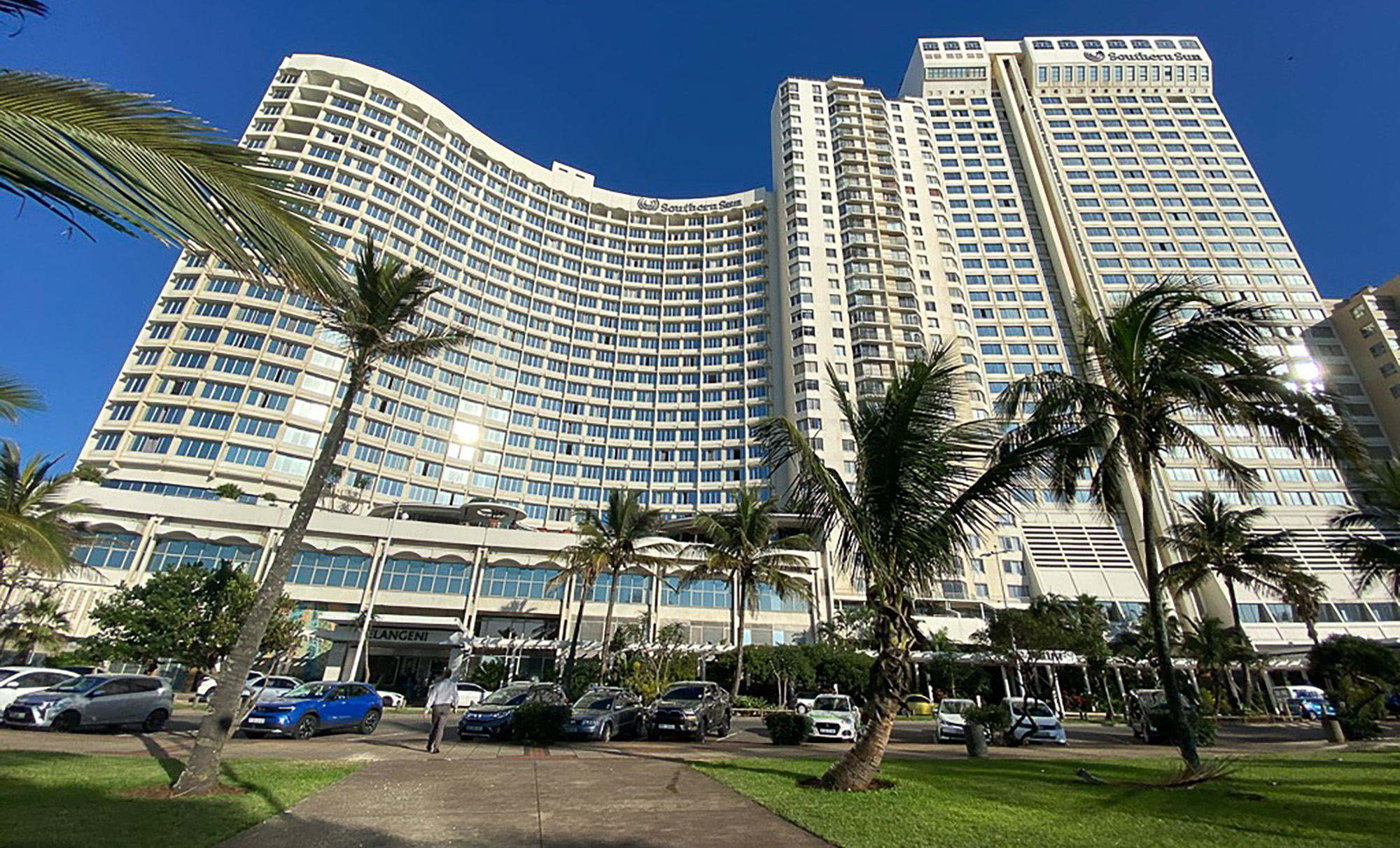
Durban beachfront’s iconic Elangeni and Maharani hotels. The district behind them is rundown and a no-go area by night, while locals say visitors avoid the promenade during the day for reasons of safety and up-and-down E.coli counts in the waves. Yet the tourism deputy minister speaks of plans to build the tallest building in Africa in the city. (Photo: Angus Begg)
While what that “focusing” entails is not clear, Mahlasela’s comment about developing “new tourist attractions, such as the planned Durban Iconic Tower, the tallest building in Africa”, when the city’s heritage and beachfront – any coastal city’s pride and joy – is in sad neglect, and the wastewater treatment works in a concerning state, is enlightening. Big figures and targets can be impressive to the electorate at large.
Anderson says focusing on the recovery of tourism, “ensuring that we implement solutions that will expedite growth and stimulate the economy” – which was so beautifully demonstrated by certain accommodation establishments and experiential product and compassionate entrepreneurs such as Henn-Murray – will be the catalyst for job creation, increased visitors to our country and foreign currency spend.
If the provincial and national tourism authorities adopt such tried-and-tested thinking – and action – it can be assumed that vision on the road ahead will be clear and achieve goals that serve both citizens and visitors. Win-win.
The Durban-born Harris says the Tourism Minister has an “exciting vision” for how the tourism industry can kickstart economic growth and job creation, and “has given the board a clear mandate to make sure SAT delivers its part in achieving this vision.”
Anderson says early feedback from Fedhasa members suggests that exhibitors are planning to return again for Indaba 2024. DM




















 Become an Insider
Become an Insider
How nice. We have some guests that loved INDABA. A few grand expressions of future improvements, from Politian’s (both governmental & private). Terrific words. Nothing ever becomes a reality. RSA is a fantastic destination, we have everything. As the Country’s slogan used to say, “A World in one Country”. Unfortunately, that is only true today if you fly from one attraction to the next. Don’t venture into country roads, they have disappeared!. But if you fly, be prepared to pay more, often nearly double for your short internal flights, than you have paid for your long flight to get to RSA.
I don’t have the solution and unfortunately, I don’t think there is one. Tourism depends on too many outside factors, over which we have no control. We’ll have to carry on, doing what we can, with what we have.
The Africa’s Travel Indaba was a great success without a very high popularity of attendees from all over the world. I believe this is the year that the event has really picked up after the downfall of events in Tourism during the Covid-19. This event is a very huge one for people who have businesses, those who wish to expand, those who wish to get investments and it is also a trade show open for different businesses to build partnerships and help each other. I had a great experience working there as a Tourism student and the event literally gave me an insight on the Tourism Industry and how wide it truly is. The wideness of the Tourism Indaba can give you a view at different business creative ideas and be able to encourage you more that every business and creativity matters. This event was an advantage to nearing businesses in Durban mostly accommodations near the ICC Exhibition Centre. Also a disadvantage in terms of noise pollution to neighbouring citizens/businesses and Durban Central itself. All in all, the event was a great success and the number of attendees really increased making it a great improvement for the trade show and South Africa(Durban) as the destination. I really hope many pupils who still have business brainstorms see this event as a way to make their dream come true and to get good partnerships or investments while attending the event in future.
This event from my view had a positive impact to our country as:
-The number of attendees led to a better and improved economy> as it was really exhilarating having to discern the high increase in attendees compared to other years which will really have an immense growth of our GDP and recover back from decreased GDP caused by covid-19 pandemic.
-Interaction of public and private sector will increase revenue and visitors>as it will stimulate local economy, generate income and increase investments and tourism operators having good marketing skills and government having better branding and advertising both they can attract number of visitors and reach their target markets.
-Tourism Indaba led to SA’s enhancement In students and rural areas>as my school fellow were working at Durban ICC, they gained information, knowledge and skills about how broad is tourism industry and got enthusiasm to work towards their goals and ambitions and not focus on negative thoughts of “tourism not having job opportunities”, as students we should also have entrepreneurial skills to start our own businesses and help our acquaintances who are at home with their qualifications. Rural areas can provide authentic culture, history and traditions to visitors as they prefer to have new experiences thus increase their profit and revenue.
-Increased profit for Durban markets and locals> as they increased their profits during this time and job opportunities were created hence increase our country’s GDP.
Despite not having a very high popularity among attendees from all over the world, the Africa Travel Indaba was a wonderful success. After the decline in Tourism related activities during covid 19 I think 2023 is the year that many events have really started to take up. Africa’s Travel Indaba this event is a significant one for business owners, those looking to grow their companies, those looking for investment and also serves as a trade exhibition where different companies can collaborate and support one another. As a student doing Tourism I find Africa’s Travel Indaba very interesting I hope in fure I can be able to attend and experience a lot of things that would help me to persuade my love of working in the Tourism industry
Dear Editor,
As a student that was given an opportunity to be a part of the 2023 Africa’s Travel indaba. I was delighted to read your article regarding the event. I found the information written on the article extremely eye opening. Also, in light of my personal experience of the event, I believe the event was an extreme success.
I agree that the Africa’s Travel Indaba is also part of the events that brought the tourism industry back on its feet. After the Covid 19 the tourism lost a lot of money due to traveling being discontinued. The industry was then forced to come up with new ways in order to make money without traveling. That is when virtual tourism was introduced.
Having an event like the Africa’s Travel Indaba, impacted the country mostly economically. It always includes creating job opportunities, especially because South Africa has a high unemployment rate. The event also gave small business owners from South Africa a chance to showcase their work. The event promotes South Africa as a host event.
I believe the Tourism Travel Indaba also aims to lure tourists into coming into the country even when the event is over. Overall the Africa’s Travel Indaba offered us an amazing experience, we are looking towards seeing what the event holds for us next year.
Yours sincerely
Kwanele Ngwenya
Durban